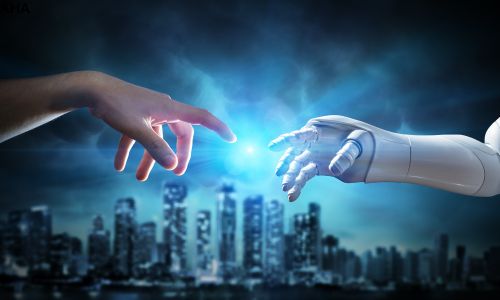Artificial intelligence (AI) is rapidly transforming our world, seeping into everyday experiences and reshaping numerous industries. But what does the future hold for AI? This blog post explores some potential developments and the exciting possibilities, along with the challenges, that lie ahead.
Advancements in Machine Learning:
Machine learning (ML), a core driver of AI, is expected to become even more sophisticated. Here’s what to expect:
- Deeper Learning: Deep learning algorithms, inspired by the structure and function of the human brain, will likely become more powerful, enabling AI to tackle even more complex tasks and make more nuanced decisions.
- Explainable AI: As AI systems become more intricate, understanding how they arrive at decisions will be crucial. Explainable AI techniques will strive to shed light on the reasoning behind AI outputs, fostering trust and enabling human oversight.
- Lifelong Learning: Mimicking the human ability to learn continuously, AI systems might evolve to learn and adapt from real-world experiences in real-time, constantly improving their performance.
The Rise of Artificial General Intelligence (AGI): A Dream or a Dilemma?
The concept of Artificial General Intelligence (AGI), also known as Strong AI, remains a topic of debate. AGI refers to machines possessing human-level intelligence and the ability to perform any intellectual task a human can. While achieving true AGI might still be far off, advancements in AI research could bring us closer:
- Cognitive Abilities: AI systems might exhibit improved reasoning, problem-solving skills, and the ability to understand and respond to complex concepts.
- Social Intelligence: Machines could develop the ability to interact with humans on a more nuanced level, potentially understanding emotions, social cues, and cultural contexts.
However, the ethical implications of AGI necessitate careful consideration. Who would be responsible for the actions of an AGI? How would we ensure its alignment with human values? These are questions that philosophers, scientists, and ethicists must grapple with as AI research progresses.
AI and the Future of Work:
Automation through AI has the potential to displace certain jobs, particularly those involving repetitive tasks. However, AI is also likely to create new opportunities:
- Human-AI Collaboration: The future of work might involve humans and AI working together, each leveraging their strengths. Humans could focus on tasks requiring creativity, empathy, and social skills, while AI handles data analysis, automation, and repetitive processes.
- Reskilling and Upskilling: Investing in education and training programs will be crucial to prepare the workforce for the changing job landscape. Equipping individuals with skills in areas like AI literacy, data analysis, and critical thinking will be essential for navigating the future of work.
AI for Social Good:
AI has the potential to address some of humanity’s most pressing challenges:
- Healthcare: AI-powered tools can assist in medical diagnosis, drug discovery, and personalized treatment plans, potentially revolutionizing healthcare delivery.
- Climate Change: AI can be used to analyze climate data, optimize resource management, and develop sustainable solutions.
- Education: AI-powered tutoring systems can personalize learning experiences and cater to individual student needs.
The Road to Responsible AI Development:
As AI continues to evolve, navigating its potential benefits and challenges will be paramount. Here are some key considerations for a responsible future of AI:
- Ethical Considerations: Bias in AI algorithms can perpetuate societal inequalities. Developing and deploying AI with fairness and ethical principles in mind is crucial.
- Transparency and Explainability: Understanding how AI systems arrive at decisions fosters trust and enables human oversight. Explainable AI techniques can play a vital role in achieving transparency.
- Regulation and Governance: As AI becomes more sophisticated, robust regulations and governance frameworks will be necessary to ensure its safe and ethical development and deployment.
The Future is Open-Ended
The future of AI is brimming with possibilities. While challenges exist, AI has the potential to usher in a new era of progress and innovation. By fostering human-AI collaboration, prioritizing responsible development, and addressing the ethical considerations, we can ensure that AI serves as a powerful tool for good, shaping a brighter future for humanity.
This glimpse into the future of AI is just the beginning. As AI research continues to break new ground, we can expect even more exciting developments that will transform our world in ways we can only begin to imagine. Are you ready to be a part of the AI revolution?



